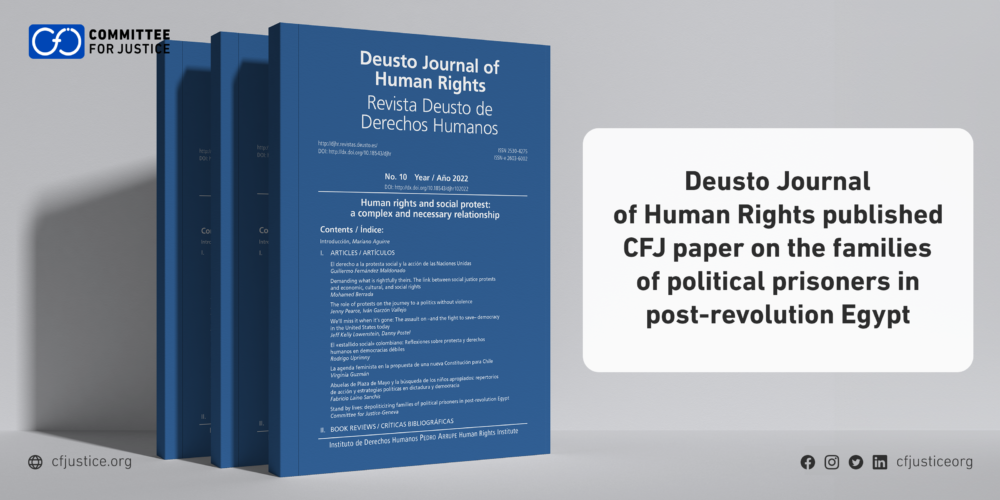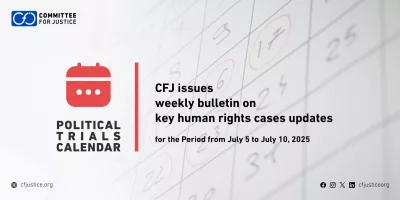The Committee for Justice (CFJ) authored a paper titled “In Defense of Lives: Depoliticization of the Families of Political Prisoners in Post-Revolution Egypt,” which was published in the Deusto Journal of Human Rights. The paper provides a summary of information gathered through interviews conducted by CFJ with 10 families and relatives of political prisoners who had experienced arbitrary detention in Egypt from June 2013 onwards. The interviews took place online and were conducted between the months of March and September 2022.
The primary focus of the interviews was to understand how ongoing political repression impacts the lives of the interviewees at a social and economic level. CFJ utilized three categorical questions to explore the challenges faced by the families, their coping mechanisms, and their future prospects in the face of political repression.
To ensure diverse representation across social and economic factors, CFJ selected the 10 cases from five governorates: Cairo, Sharkia, Alexandria, Menoufia, and Qalyubia. These families and relatives are connected to individuals who were not widely known but were victims of arbitrary detention and unfair trials. The selected cases encompassed both direct and indirect supporters and participants in the protests that emerged from the January 25 revolution and its subsequent events.
The paper extensively examined the profound implications of human rights violations on the depoliticization of individuals closely associated with political prisoners, namely their wives, parents, and children. It delved into the consequential effects on their endeavors to overcome economic hardships, as well as their attitudes towards immigration, protest, and political reconciliation with the ruling regime. The study explored the multifaceted personal, economic, social, and political ramifications of repression, ultimately leading to a greater degree of depoliticization among individuals indirectly affected by human rights violations.
Furthermore, the paper offered a meticulous analysis at the micro level, scrutinizing the impact of repression and human rights violations on the lives of Egyptian families with political prisoners. It specifically addressed the prevailing
context of an increasingly authoritarian regime, accentuating the influence of disappointment and grief on the families’ capacity to cope with loss and actively participate in constructive ways within society.
The paper highlights the significant impact of violent repression on societal dynamics, specifically referencing key events such as the Battle of the Camel in 2011, the brutal dispersal of demonstrators during the Rabaa al-Adawiya and al-Nahda sit-ins in August 2013, and the widespread suppression of opposition groups since 2014. These incidents have played a crucial role in fostering a sense of self-centeredness among citizens and directing their focus towards individual strategies for personal salvation.
The extensive repression experienced by the populace has led individuals to prioritize certain actions and goals. These include the emphasis on family reunification, as people seek solace and support within their immediate kinship networks. Furthermore, there has been a notable surge in entrepreneurial endeavors, with individuals striving to establish their own businesses as a means of reclaiming control over their shattered lives.
The repressive actions taken by the Egyptian authorities have significantly contributed to a prevailing sense of despair, isolation, and a feeling of being unworthy among the population. Additionally, the deliberate destruction of spaces for communication, where people can develop shared understandings and express grievances, coupled with the systematic suppression of collective social experiences, has resulted in the families of political prisoners being marginalized and portrayed as enemies of the nation. This has led to severe disruptions in personal and social relationships, as well as a deep mistrust in the political and judicial institutions that are expected to provide relief and justice for the victims. Consequently, the individuals interviewed for this study have experienced a decline in their social existence, prompting them to adopt various strategies and make choices aimed at personal fulfillment and political dissent.
Based on the evidence gathered from the interviewees, this study reveals contradictory attitudes towards protest and collective mobilization. It finds that engaging in protests is a dynamic and ever-evolving choice influenced by the highly unstable social and political environment in Egypt.
Conversely, depoliticization emerges as a strategic decision made by individuals who hold diverse and conflicting views on power dynamics and societal engagement. As a result, all the participants in the study expressed strong support for reconciliation with the authorities, emphasizing the importance of family reunification and seeking social and economic stability in exchange for their involvement in political activities.






